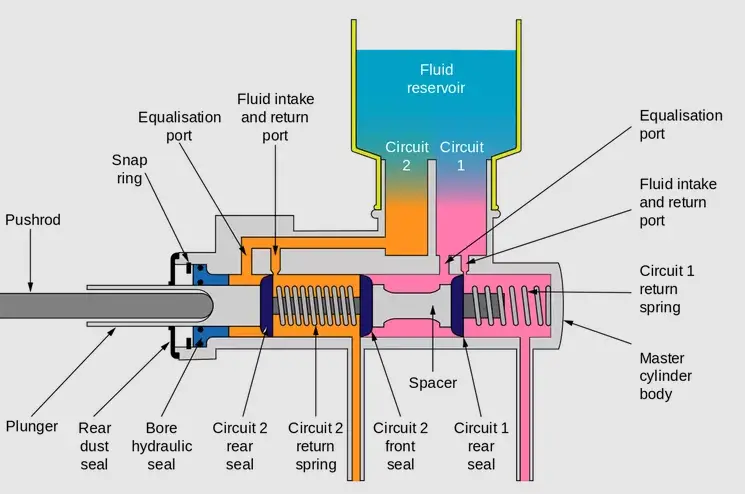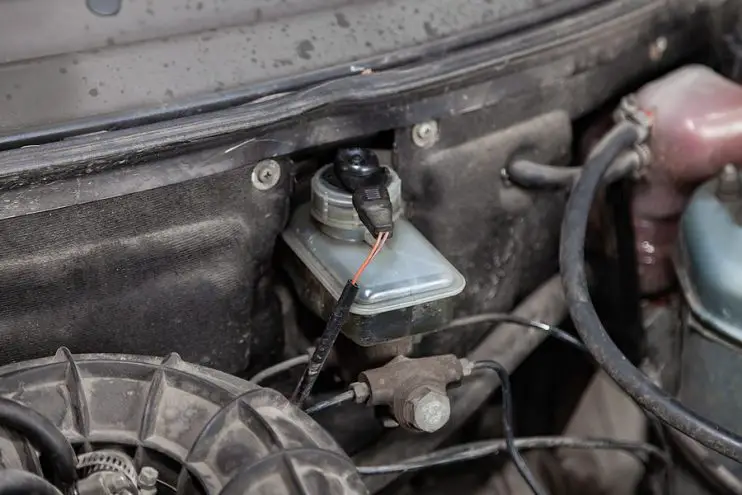Brake fluid not returning to the master cylinder can cause dragging brakes and overheating. Common causes include a faulty master cylinder or clogged lines. Prompt repairs and regular maintenance are essential for safety.
Brake fluid plays a crucial role in your vehicle’s braking system, as it transmits the force from the brake pedal to the brake calipers or drums, enabling your car to stop. When brake fluid fails to return to the master cylinder, it can compromise braking performance and lead to potentially dangerous situations. In this blog, we’ll explore the causes of this issue, how to identify it, solutions to fix it, and tips for prevention.

How the Master Cylinder and Brake Fluid Work
The master cylinder is the heart of the hydraulic braking system. When you press the brake pedal, the master cylinder creates hydraulic pressure that pushes brake fluid through the lines to the calipers or wheel cylinders. These components, in turn, engage the brake pads or shoes, bringing your vehicle to a stop. Once you release the brake pedal, the brake fluid is supposed to flow back to the master cylinder, relieving pressure in the system.
If the brake fluid doesn’t return, it can result in excessive pressure buildup, dragging brakes, or even complete brake failure.
Symptoms of Brake Fluid Not Returning to the Master Cylinder
Symptoms of brake fluid not returning to the master cylinder include:
- Dragging Brakes: The vehicle may feel like it’s being slowed down even without pressing the brake pedal.
- Overheated Brakes: Continuous pressure can cause the brake components to overheat, emitting a burning smell.
- Reduced Brake Pedal Response: The brake pedal may feel unusually firm or resistant.
- Locked Wheels: Wheels may not release after braking, making the car difficult or impossible to drive.
Causes of Brake Fluid Not Returning to the Master Cylinder
Common causes of brake fluid not returning to the master cylinder include:
- Clogged or Contaminated Brake Lines: Dirt, rust, or debris in the brake fluid can clog the lines, preventing fluid from flowing freely back to the master cylinder.
- Faulty Master Cylinder: A damaged or worn-out master cylinder may fail to release pressure properly, causing fluid retention in the brake lines.
- Damaged Brake Calipers or Wheel Cylinders: Corroded or stuck caliper pistons or wheel cylinder components can restrict fluid return.
- Collapsed or Kinked Brake Hoses: Flexible brake hoses can deteriorate internally, collapsing and blocking the fluid flow.
- Failed Brake Pedal Return Spring: A broken or weak pedal return spring can prevent the brake pedal from fully releasing, keeping pressure in the system.
- Improperly Adjusted Push Rod: If the brake pedal push rod is misadjusted, it can prevent the master cylinder piston from returning to its original position, blocking fluid flow.
- Air in the Brake System: Air pockets in the brake lines can interfere with the fluid’s flow and cause irregular pressure.
- Use of Incorrect Brake Fluid: Using the wrong type of brake fluid can lead to improper operation of the hydraulic system.

How to Diagnose the Issue
Diagnosing why brake fluid isn’t returning to the master cylinder involves a systematic approach:
- Inspect Brake Lines and Hoses: Look for visible leaks, kinks, or signs of corrosion.
- Check the Master Cylinder: Remove the master cylinder cap and inspect for proper operation and fluid condition.
- Examine Brake Calipers and Wheel Cylinders: Ensure the pistons are moving freely and retracting properly when the brakes are released.
- Test the Brake Pedal Assembly: Check the return spring and ensure the push rod is properly adjusted.
- Bleed the Brake System: Remove any trapped air from the brake lines to ensure fluid can flow freely.
- Analyze the Brake Fluid: Examine the fluid for contamination, discoloration, or improper viscosity.
How to Fix Brake Fluid Not Returning to the Master Cylinder
To fix brake fluid not returning to the master cylinder, follow these steps:
- Flush and Replace Brake Fluid: If contamination is the issue, flush the entire braking system and refill it with fresh, manufacturer-recommended brake fluid.
- Repair or Replace the Master Cylinder: Replace faulty master cylinder components or the entire unit if necessary.
- Replace Damaged Brake Lines or Hoses: Swap out any corroded, kinked, or collapsed lines and hoses to restore proper fluid flow.
- Repair or Replace Calipers and Wheel Cylinders: If the pistons are stuck or damaged, repair or replace these components.
- Adjust the Brake Pedal Push Rod: Ensure the push rod is correctly adjusted to allow the master cylinder piston to return fully.
- Check and Replace the Brake Pedal Return Spring: If the return spring is broken, install a new one to ensure the pedal releases completely.
- Bleed the Brake System: Remove any air from the system using a proper bleeding procedure.
Preventing Brake Fluid Flow Issues
To prevent brake fluid flow issues, follow these essential tips:
- Perform Regular Maintenance: Schedule routine brake inspections to catch potential problems early.
- Use the Correct Brake Fluid: Always use the type of brake fluid specified in your vehicle’s owner’s manual.
- Flush Brake Fluid Periodically: Replace brake fluid every 2–3 years or as recommended by your vehicle’s manufacturer to prevent contamination.
- Inspect Brake Lines and Hoses: Regularly check for wear, leaks, or corrosion and address issues promptly.
- Replace Worn Components: Replace brake components like calipers, master cylinders, and hoses at the first signs of wear or failure.
Why Ignoring This Problem is Dangerous
Neglecting to address brake fluid issues can lead to severe consequences, such as:
- Complete brake failure.
- Overheated brake components that may cause permanent damage.
- Increased risk of accidents due to poor braking performance.
Braking problems should always be treated as high-priority repairs to ensure your safety on the road.
Frequently Asked Questions
Here are some FAQs about brake fluid not returning to the master cylinder –
1. What causes brake fluid to stop flowing back to the master cylinder?
This can be caused by a faulty master cylinder, clogged brake lines, damaged hoses, stuck calipers, or improper brake pedal adjustment.
2. Can I still drive with this issue?
No, driving with brake fluid flow issues can lead to reduced braking performance or complete brake failure, putting your safety at risk.
3. How do I know if my brake fluid is contaminated?
Contaminated brake fluid may appear dark, cloudy, or have a burnt smell. A spongy brake pedal is another indicator.
4. How much does it cost to fix this problem?
Repairs can range from $100 to $500 or more, depending on the specific issue and the components involved.
5. How often should I replace brake fluid?
Brake fluid should be replaced every 2–3 years or as recommended by your vehicle’s manufacturer to prevent contamination and maintain optimal performance.
Conclusion
By addressing brake fluid issues promptly and maintaining your braking system, you can ensure safe and reliable vehicle operation for years to come. Always consult a trusted mechanic if you encounter problems with your brakes.